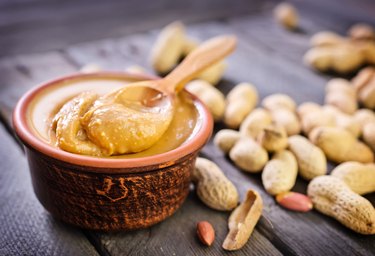
If you believe rich foods such as peanut butter contribute to acne flareups and pimples, you're not alone. When researchers interviewed medical students during their final year at Melbourne University in 2001, 41 percent believed that dietary choices intensified acne symptoms. Scientific studies do not demonstrate a clear connection between specific foods and acne outbreaks, but some research does indicate that a poor overall diet creates hormonal imbalances that trigger this common skin disease.
Causes of Acne
Video of the Day
Oil glands at the base of hairs in the skin of your upper body normally generate small amounts of sebum, an oil that spills from the follicle onto the skin surface. When your body secretes too much sebum, the oil mixes with dead skin cells and clogs pores. Bacteria trapped in the pores digest the oil and secrete acids that cause local irritation. Pimples eventually burst and often heal without serious problems, but infections can cause pus-filled cysts to form in tissue deep beneath the skin. Increased testosterone levels during puberty trigger acne in teenagers, but the disease could strike at any stage of your life.
Video of the Day
Diet and Acne
Because most people with acne also have oily skin, many health professionals and people with acne concluded that oily and fatty foods such as peanut butter and chocolate contribute to acne problems. Test studies failed to show a clear correlation between rich foods with high fat or sugar content and the intensity of acne, according to Parker Magin of the University of Newcastle, New South Wales, Australia. Observations of non-Western cultures in both Paraguay and New Guinea found no cases of acne among populations living on a traditional diet, leading researchers to suspect that Western diets in general, not specific foods, may cause acne.
Peanut Butter's Nutrients
Replacing some fatty meat products in your diet with the healthful fats and protein in peanuts could improve your health. A 32 g serving of dry-roasted peanuts contains nearly 16 g of fat, but only 2.2 g of saturated fat and no cholesterol. The same serving provides 7.58 g of protein, 1.34 g of sugar and 6.88 g of carbohydrate. Eating as little as 1 1/2 oz. of peanuts daily could lower your risk of heart disease, according to the Linus Pauling Institute.
Peanut Butter's Hazards
Simple carbohydrates and sugars added to peanut butter to improve flavor and texture could aggravate acne problems. Easily digested high-glycemic foods cause a surge in blood sugar levels and a matching rise in blood insulin. Shifting levels of insulin and blood sugar cause increased androgen production in your body. This group of male hormones increases sebum production. As glands in your skin secrete more oil, follicles clog and a new acne outbreak begins. Choosing a brand of peanut butter with no extra ingredients could ease your symptoms, if added to a healthy diet plan.